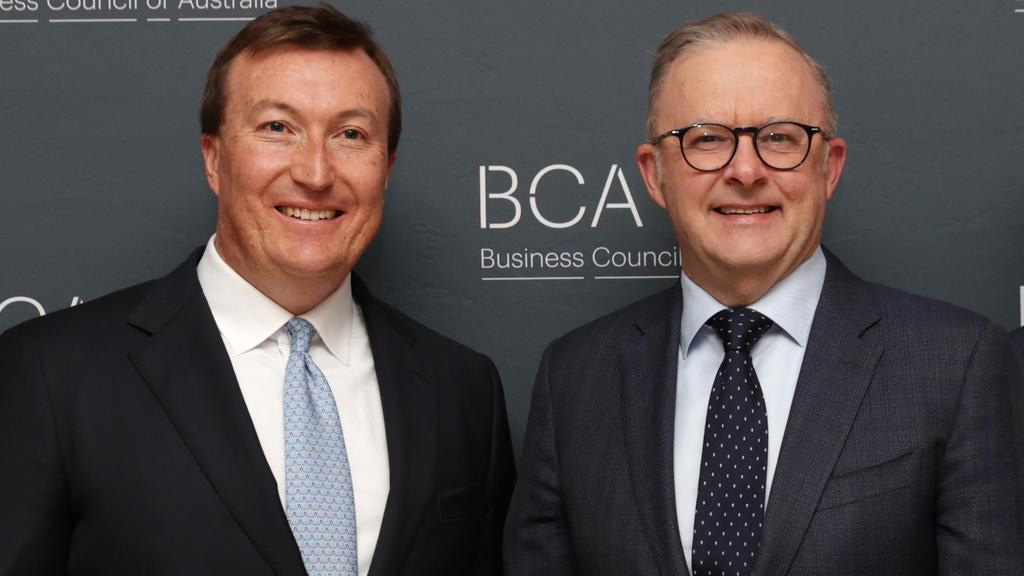
Article by Greg Brown, Glenda Korporaal & Joyce Moullakis, courtesy of The Australian.

Business leaders are reviving calls for Anthony Albanese to lower the corporate tax rate, warning Australian businesses will be increasingly uncompetitive under Donald Trump’s plans to slash company taxes in the United States to 15 per cent.
Business Council of Australia chief executive Bran Black said “company leaders were telling him it was “getting harder and harder to attract investment to our shores”.
“Australia should have a lower company tax rate,” Mr Black said.
“Australia has the third highest company tax rate in the OECD, ahead of only Portugal and Colombia. If the US cuts company tax rates to 15 per cent it will cause investors to go there and not Australia. We know this will happen as we saw it in 2017 when the US cut its company tax rate the last time.
“When the US company tax rate was lowered in 2017, US domestic investment rose 20 per cent and caused US direct investment into Australia to fall.”
The corporate tax rate in Australia is 25 per cent for companies with a turnover of less than $50m and 30 per cent for bigger businesses.
Virgin Australia International Holdings chairman Graham Bradley, a former BCA president, said Mr Trump’s promised move to reduce corporate taxes in the US “would put continued pressure on Australia to follow suit”.
Mr Bradley, who is also chairman of Infrastructure NSW, Shine lawyers, and Symphony Infrastructure Partners, said Australia already had “highly uncompetitive tax rates compared to Europe and the US and even New Zealand.”
“This has been evident for some time,” he said.
“There will be a lot more pressure on future governments here now to match, or at least bring down our corporate tax rates to maintain our attractiveness as a destination for capital.”
National Australia Bank chief executive Andrew Irvine backed “holistic reform” of tax, including the axing of payroll tax.
However, Mr Irvine cautioned it was not the right time for a “big tax stimulus”. “You’ve got to be competitive on levels of taxation for businesses, because businesses can set up anywhere, and then maybe there’s an opportunity for more spend-based tax to counteract that,” Mr Irvine said.
“But you have to watch that … if you have a significant tax reduction stimulus that creates demand, and therefore … you’ll have higher rates. So you’ve got to thread the needle there.”
Australian Industry Group chief executive Innes Willox said productivity and the economy would continue to flatline if “business continues to drown under an ever increasing regulatory burden and an uncompetitive company tax regime”.
“This (US election) result will ramp up pressure for tax and regulatory reform in Australia which will risk being left behind and uncompetitive when it comes to attracting investment and capital if Trump pushes ahead with his plan,” Mr Willox said.
“Australia is a relatively high- tax, high-cost economy as it is and capital will inevitably flow to where it is most welcome.”
Sydney businessman Maurice Newman said the election of Mr Trump meant Australia and the US were now heading in different policy directions including on corporate tax.
Mr Newman, a former chairman of the ASX and the ABC who is currently an adviser to the Marsh group of companies and chair of Australian Digital Holdings, said the outcome of the US election had “wrong footed Australia.”
“Corporate taxes will be lowered while Australia looks to extract more in royalties and other taxes,” he said.
“The US election should send a loud wakeup call to Canberra. It may take a change of government before it is taken seriously.”
Australian Chamber of Commerce and Industry chief executive Andrew McKellar said the corporate tax rate should be reduced to 25 per cent for large businesses.
